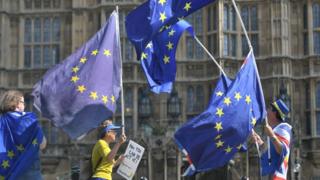 Image copyright
PA
Image copyright
PA
The government is making fresh attempts to resolve a row about how much of a say MPs should have over Brexit.
A Tory rebellion on the EU Withdrawal Bill was avoided on Tuesday after a meeting between Theresa May and more than a dozen MPs.
But with more Parliamentary votes to come on the bill, the would-be rebels say the PM must honour "assurances" they say they received.
Brexiteers do not want Parliament to be given more power.
The government says it will table fresh proposals later on Thursday.
What's going on?
The UK is due to leave the EU in March 2019, and negotiations have been taking place on the terms of the separation and how the two sides will work together in the future.
The government is trying to pass a new law, called the EU Withdrawal Bill, which it says is needed to ensure a "smooth and orderly Brexit".
Its main purposes are to end the supremacy of EU law in the UK, and transfer existing EU law into UK law so the same rules and regulations apply on the day after Brexit.
But as it passes through Parliament, MPs and peers have been trying to change it, in some cases adding bits on that would change the government's Brexit strategy.
These include moves to give Parliament more of a say in the event that it votes to reject the deal stuck between the UK and the EU, or if no deal is reached at all.
Ministers say they cannot allow MPs to decide what happens next in these circumstances as it would bind their hands in negotiations.
But supporters of the move say it would enable Parliament to avoid an economically damaging outcome for the UK.
After the House of Lords changed the bill to give Parliament a more decisive say, MPs voted on Tuesday to reverse the move - but several pro-EU Tories say they held back from voting against the government because of promises they were made that their concerns would be listened to.
In the House of Commons, Labour's Brexit spokesman Sir Keir Starmer pressed Brexit Secretary David Davis on seemingly conflicting accounts of what the would-be rebels were offered.
Mr Davis would not be drawn on the details, saying the proposal would meet three criteria: that it does not overturn the referendum result, does not undermine negotiations and does not change the country's constitutional structure which involves the government negotiating.